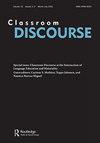Using online translation tools in computer-assisted collaborative EFL writing
IF 1.6
Q2 EDUCATION & EDUCATIONAL RESEARCH
引用次数: 9
Abstract
ABSTRACT This study applies multimodal conversation analysis to examine how pupils of L2 English in Sweden make use of online translation tools (OTTs), i.e. bilingual dictionaries and Google Translate, in a range of digital collaborative writing tasks. The collection of sequences where pupils use OTTs comes from 31 hours of video-recorded data from four Swedish upper-secondary schools. In contrast to previous research on OTTs, this multimodal micro-analytic study examines the process of using OTTs and links it to the written product, by analysing actions on the screen accompanied by embodied pupil interaction. Thus the analyses track: (1) how and when pupils deploy OTTs, (2) whether the tools help them to resolve lexical gaps and other lexical issues and (3) what problems arise in the process. The study also discusses what help can be offered to overcome the encountered difficulties of using OTTs.在线翻译工具在计算机辅助英语写作中的应用
本研究采用多模态会话分析来研究瑞典的第二语言英语学生如何在一系列数字协作写作任务中使用在线翻译工具(OTTs),即双语词典和谷歌翻译。学生使用OTTs的序列收集来自瑞典四所高中的31小时视频记录数据。与之前关于在线阅读的研究不同,这项多模态微观分析研究通过分析屏幕上伴随着瞳孔互动的动作,考察了使用在线阅读的过程,并将其与书面产品联系起来。因此,分析跟踪:(1)学生如何以及何时使用在线教学;(2)这些工具是否帮助他们解决词汇空白和其他词汇问题;(3)在这个过程中出现了什么问题。本研究亦探讨了如何克服使用ott时所遇到的困难。
本文章由计算机程序翻译,如有差异,请以英文原文为准。
求助全文
约1分钟内获得全文
求助全文

 求助内容:
求助内容: 应助结果提醒方式:
应助结果提醒方式:


